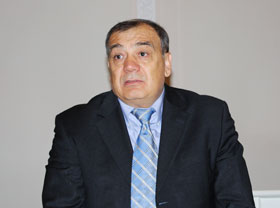Nuclear Physics Institute of Uzbekistan Science Academy created Radiological Test Laboratory within the grant of Closed Nuclear Centers Partnership Programme, which is financed by the British government, at the support of Uzstandard Agency and Ministry of Healthcare of Uzbekistan.
Askar Safarov, director of Nuclear Physics Laboratory of Samarkand State University, said that the Radiological Test Laboratory was created to carry out analysis of radiation security of food products and construction materials in line with international standards.
He said that Uzbekistan adopted new sanitary norms and rules in 2010, which set requirements on radiation security of food products.
“In line with the requirements, foods should be tested for content of radioactive nuclides, such as caesium and strontium. In 2010, only Tashkent has opportunities to carry out such analysis. In this connection, there was requirement to organize regional laboratory, equipment with modern spectrometric equipment and skilled cadres,” he said.
He said that Radiological Test Laboratory was founded in October 2010 as part of the Nuclear Physics Institute of Uzbekistan Science Academy and accredited by Uzstandard. Audit results, conducted by Uzstandard, confirmed that Radiological Test Laboratory met requirements of ISO/IEC 17025:2005 standards.
He said that Radiological Test Laboratory carries out spectrometric analysis of food products, construction materials, mineral fertilizers and forage for radioactive security with use of modern gamma- and beta-spectrometric equipment.
Currently, there are three regional subdivisions of the laboratory in Tashkent under the Nuclear Physics Institute, in Samarkand under Nuclear Physics Laboratory of Samarkand State University and in Ferghana city under the Ferghana regional Center of state sanitary-epidimialogy supervision, he said. He added that it is planned to open several subdivisions.
Safarov stated that the laboratory linked subdivisions with Internet, which raise reliability and correctness of the analysis. This allows to control quality of spectrometric analysis, gathered in regions, in Tashkent.
In the end of January 2011, the laboratory signed the first contracts to carry out certification analysis of food products and construction materials. Currently, Radiological Test Laboratory signed long-term agreements with Goods Certification Bodies in Tashkent, Samarkand, Jizzakh, Surkhandarya, Kashkadarya and Ferghana regions, as well as with food and construction materials producers.
As of the end of October 2011, the laboratory carried out 1,500 radiologic analyses of goods. For example, over 800 tests of food products and 500 tests of construction materials were carried out in Tashkent and Samarkand.
Askar Safarov underlined that 47.1% of tests were conducted in Tashkent subdivision, 46.2% in Samarkand and 6.7% in Ferghana. He said that no products with high radiation were detected so far.
It was noted that the laboratory in partnership with Center of State Sanitary-Epidemiologic Control and Uzstandard plans to analyze radiation security of drinking water, metal scrap, as well as air in rooms.

Umar Salikhbaev
Head of the Institute underlined that it is actively work on commercialization of its solutions. He said that Nuclear Physics Institute received 3.025 billion soums of budget resources in 2010 and 5.125 billion soums of off-budget funds.
Salikhbaev underlined that the institute earns money due to goods exports, economic agreements, scientific-technical assistance and foreign grants.